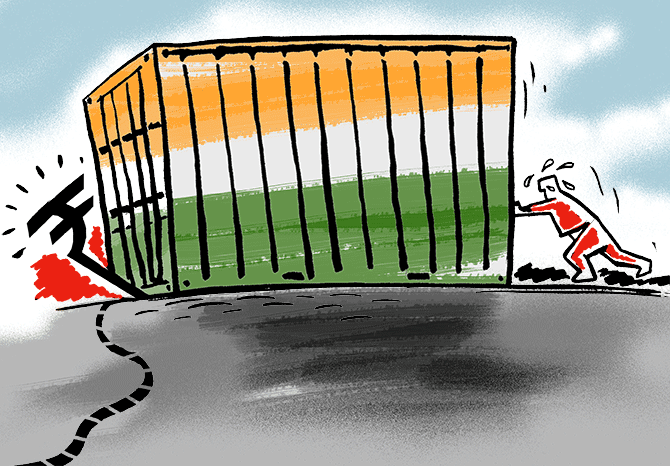 | « Back to article | Print this article |
Seven years after Modi took office, merchandise exports were lower in 2020-2021 than when he had taken over from Manmohan Singh, points out Aakar Patel.

In 2004, when Manmohan Singh took over as prime minister, India's merchandise exports stood at $63 billion.
In 2014, when Dr Singh left, India's merchandise exports were $312 billion. Meaning that under the UPA government exports grew by 17% each year for 10 years.
In March 2020, the year before Covid, merchandise exports were $314 billion. Meaning there was no growth in merchandise exports in six years.
This stagnancy is not entirely the fault of policy and governance in India. The fact is that global trade, which rose during the UPA decade, stagnated in this period.
However, it is also the case that other nations did well in these same years. For instance, Bangladesh and Vietnam were able to grow their exports and their share of global trade in the period that we stood still.
In some months in this long period of stagnancy when India registered growth, the NDA ministers would come out and make much of it.
Then minister for commerce and industry Suresh Prabhu tweeted on 13 October 2017 that 'India's growth story is back! Exports grow by 25.6% in September '17 as compared to Sep'16. #Leadership @narendramodi".
So what were exports for that full year? They were $302 billion, lower than in 2014, but that the minister did not say because it would reveal that there had been a fall since Modi had taken over.
In August 2018, he promised exports would double in the next five years without explaining what the government was doing to bring this about.
After the first wave of the pandemic, global trade shot up in 2021.
It grew by a quarter after years of stagnancy. The prices of commodities and oil also rose.
India's merchandise exports in 2021 crossed $400 billion for the first time because of this.
On April 4 this year, the Press Information Bureau put out a release headlined: 'India achieves an all-time high annual merchandise exports, touching USD 417.81 billion in FY 2021-22, an increase of 43.18% over USD 291.81 billion in previous fiscal'.
Note that in 2020-2021, seven years after Modi took office, merchandise exports were lower than when he had taken over from Singh.
And yet once again, the government rushed in to claim credit for the prime minister's magical policies which had achieved this feat.
'India targeting $1 trillion exports by 2030: Piyush Goel' was a story reported by a news agency.
Now 1 trillion is 1,000 billion.
'We are in the game for around $100 billion each way in the next six to seven years. We are in the game for at least $250 billion bilateral trade. I would like all our industry people to set the timeline. I think it's possible and I come with renewed enthusiasm after having achieved India's historic high of $400 billion plus exports for the first time ever,' Goyal said.
He padded this with the usual bombast: 'We focus a lot on public investments. Our budget this year was largely about government funded infrastructure projects on the back of which we see the multiplier effect helping us on the demand side and that is leading to more investments to meet the supply constraints.'
Notice the absence of all reference to why this growth had happened, the avoidance of mentioning why it hadn't happened for all the years before the pandemic, and the evasion of an explanation of how this growth would happen.
To go from $417 billion to $1,000 billion by 2030 would mean growing exports annually at 13%.
Goyal spoke at the end of March, when the numbers for the previous financial year came in.
What has happened since? A few days ago, on October 3, the PIB put out a release where it revealed that merchandise exports in September 2022 were lower than a year ago.
In August also, exports were lower than in 2021. This should surprise nobody, given the state of the world, the war in Ukraine and the fear of slowdown and even recession in the developed world, especially the United States.
What was the response of the government to this revelation that the exports boom of one single year had come to a halt?
There was nothing of course, and nothing is really expected. This is how this government functions.
It jumps to claim credit when there is some good news, even though that may have nothing at all to do with government policy, and they run away and hide when there is either bad news or nothing to report.
The World Trade Organisation has cut its growth forecast of global trade for 2023 to 1% and said that the war in Ukraine could darken things further.
Meaning that unless India does something proactively that affects our exports positively, trade growth will decline as it has with the world trend for the last several years before Covid.
The subject here is exports, but they illustrate the manner in which most things, particularly those concerning the economy, have been projected since 2014.
For whatever reason, the media in India, including the business press, does not report the longer term issues.
This allows the government to say the sorts of things it does, and get away with its performance, as it has on the side of the economy.
Aakar Patel is a columnist and writer and you can read Aakar's earlier columns here.
Feature Presentation: Aslam Hunani/Rediff.com